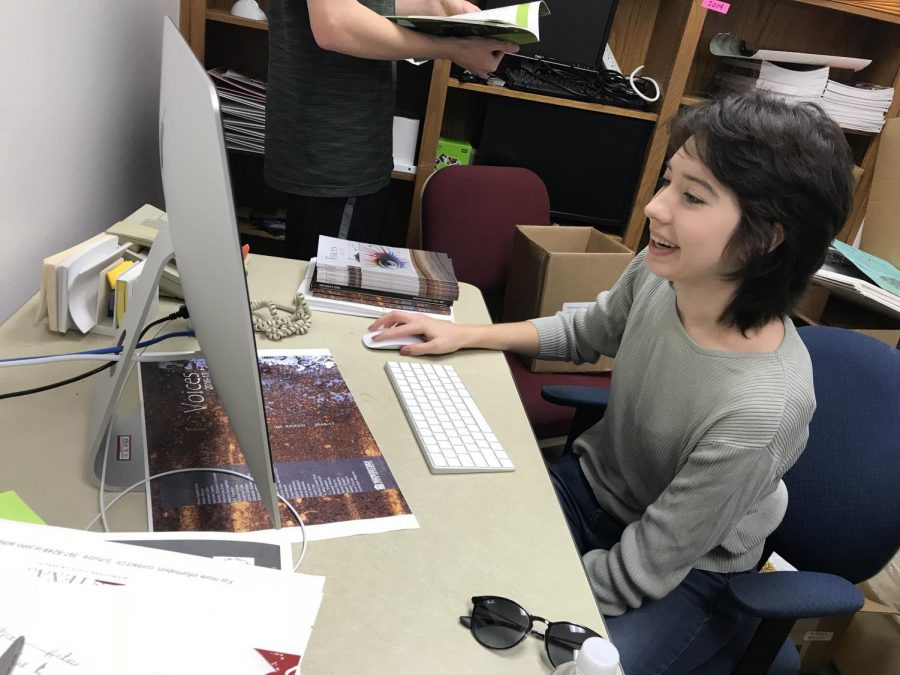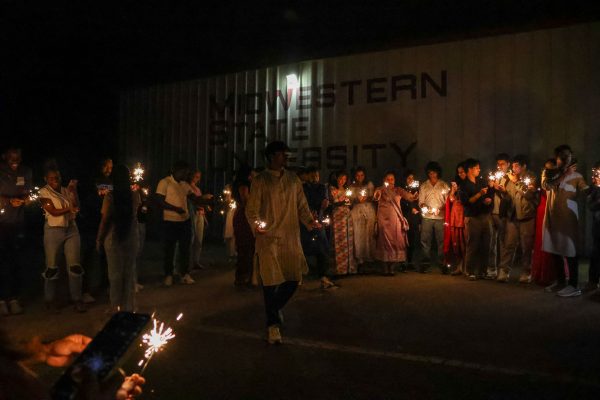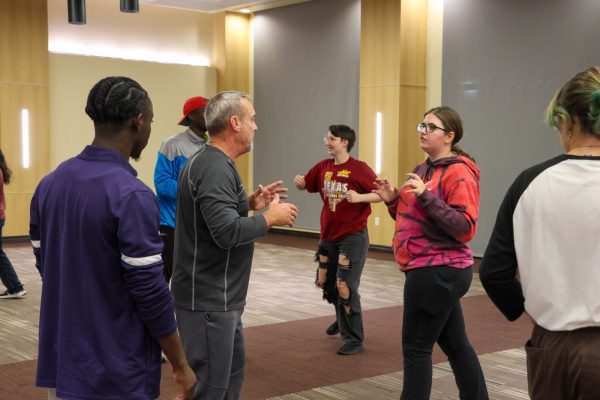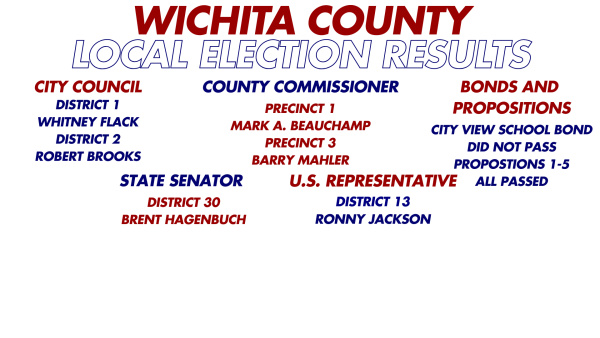Voices allows students to express themselves through literature and art
Lights! Camera! Action!
To allow students creativity to flow, share their writing, art and to express themselves, Voices art and literary journal is accepting submissions from students until Dec. 7. Giving the opportunity for aspiring writers and artists to get their work published.
Voices accepts submissions from high schools, undergraduate and graduate students in Oklahoma, New Mexico and Texas.
“It is one thing to celebrate the creative work of MSU students and there’s nothing wrong with that. But for MSU visibility in the region to expand, I thought the journal needed to expand so students who are graduating from high school from Austin for instance, have they ever heard of Midwestern State? So how can we as the only public liberal university in the state, get on these people’s radar? So this was an opportunity to reach out and expand our profile, or increase our profile across the state, across the region,” John Schulze, assistant professor of English and Voices adviser, said.
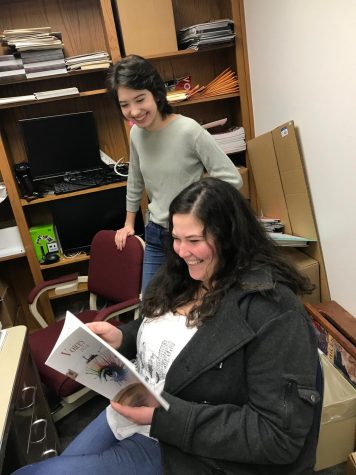
The journal allows students to submit poems, short stories, prose passages, art and photography and are given opportunities to win money based on their submissions.
Awards
- Poetry
- First place – $100
- Second place – $50
- Third place – $25
- Prose
- First place – $100
- Second place – $50
- Third place – $25
- Cover art award – $100
- Bryan L. Lawrence Creative Writing Award – Given to the best journal submission
- The President’s Award for Creative Writing
Schulze said he hopes that the journal may one day even go national and that next year the budget can include an award for students who submit art.
The editors who work on the journal are able to represent their school at award competitions.
“I [feel] like I’ve done something for MSU, we’ve been entering competitions and stuff like that. It feels good to be able to represent MSU like that, to be able to win awards,” Lane Riggs, English senior, said.
Despite the journal not being published in 2015, it won first place in Division 3 in the Texas Intercollegiate Press Association award for the 2016-2017 issue.
“We put so many hours in creating that first, new edition and to be able to see something for our work was immediately validating and satisfying,” Whitney Atkinson, English senior, said. “We had readership on campus and people were complimenting us and we could see the journal in the building and in people’s hand, but also getting that title behind it was really validating. This is something that we should keep doing and working to perfect, make it more diverse each semester.”
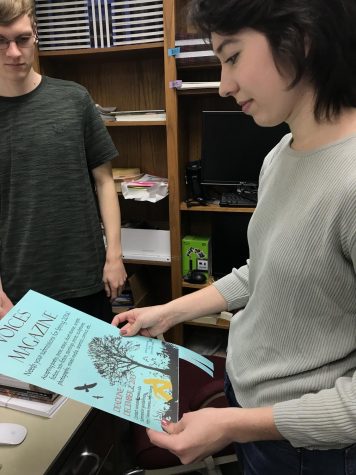
The benefits of being a student editor
Journal editors are students and being an editor counts as an independent study, making it possible for editors to gain an advanced class credit. Student editors are also able to interact with computer programs, furthering their technological skills.
Riggs who is an aspiring magazine editor or newspaper reporter said she enjoys being able to experience working with Adobe Photoshop and Adobe InDesign.
“[I’ve learned] mechanical and technical errors and things like this [journal] benefit me in my own personal writing. In Dr. Schulze intermediate creative writing class, [I’m able] to take in what I’m learning in class and apply it to Voices and also vice versa,” Lexi Murphy, English senior, said.
Editors benefit in more ways than just academically, they also get to work with other students with similar interests.
“I’ve met a great group of people, you get to read all this stuff and see what everyone’s thinking or going through. Our last issue was pretty political, and it was good to think that I’m around like minded people, so I would think that is a huge benefit,” Riggs said.
Student editors don’t have to be English majors to become an editor.
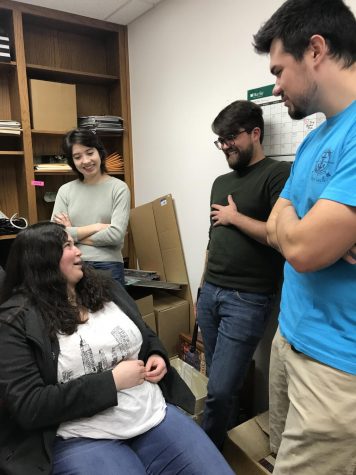
“I don’t get a huge chance to socialize with other English majors, because I’m in Dillard [building] so often, but now that I’m in Voices, I get to talk with English majors and relate to them and just see their different backgrounds. Plus it is fun editing papers and stuff for me,” Morgan Lowe, general business senior, said.
Annually, new editors and past editors join the Voices team, making each journal unique. Usually they are scouted by Schulze after taking his creative writing courses.
“Every year there is a new group of editors and [they] have a new mission of where the magazine should go. It is interesting to see that there’s not one right way to do it. It’s never going to be the same,” Atkinson said.
Voices journal is open to all students, not just English majors
Students are able to submit any work to the journal, as long as it meets the submission guidelines.
“Voices shows that you don’t have to be good [writer] per say, you just have to take the chance,” Riggs said.
Since the magazine is open to students of all ages in the tri-state area, a diverse set of art and literature is able to be showcased in the magazine.
“[Voices is] all sorts of things, it is art it is poetry, true and fiction. In one way, it is a reflection of what MSU is and it is peer sharing stories and a reflection of the country,” Schulze said.
First-time writers are able to submit their work because no prior writing experience is needed, giving students an opportunity to show their creative side.
How to be a student editor
- Not exclusive to English students but generally are English majors.
- Have an interest in creative writing.
- Be good readers and be well read.
- Adviser usually scouts from his creative writing classes, oftentimes looking for people that discuss stories in class well.
“You don’t even have to have any prior writing experience to even submit. You can write a little blurb of a three stanza poem and if you think it is the greatest thing, submit it. Or if you took a picture of a bird and you think it is very aesthetically pleasing, submit it,” Murphy said. “I think a lot of people are withholding submissions because they feel it isn’t good enough or whatever, but come on you can put this on your resume.”
Funding for the journal
Annually the adviser and student leaders request funds as part of the student allocation process. For the 2018-2019 journal, a budget of $6000 was requested. This money is used for advertising, promotion and printing of the actual journal. The money given out for the awards also come from the requested budget. Editors do not get paid for working on the journal. Source – John Schulze
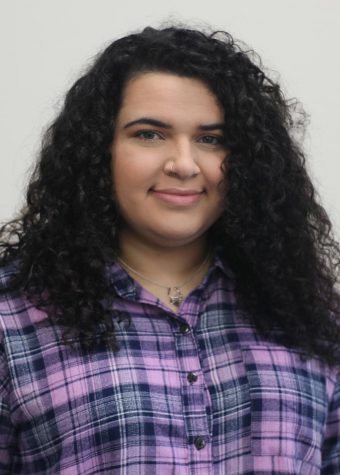
Yerasly Duran is a journalist for The Wichitan. She is double majoring in mass communication and English, minoring in public relations and advertising....



